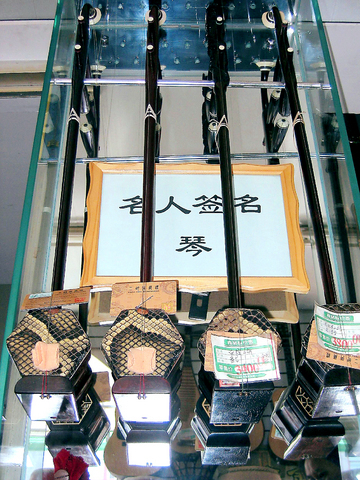he sad and sonorous sound of the erhu, the musical instrument that epitomizes Chinese music, is weathering an attack from nature lovers who fear its snake skin covered sound box is driving the mighty python into extinction.
Favorably compared to the violin, the erhu is revered in China for its natural sound and has long been viewed as the instrument that best reflects the human voice, most notably a weeping lady.
Countless pieces of music, mostly sad and melancholy, have been written for the long-necked two-stringed instrument, played with a horsehair bow and boasting a more than 1,000 year history.

PHOTO: AFP
"The most important part of the erhu is the python skin, the reverberations of the skin give the erhu its unique sound," said Yang Youlin, manager of the Beijing Music Book Store.
"Without the python skin, an erhu is not an erhu. Snake skin, sheep skin, wood, won't do."
Even the cost of an erhu, which range up to 8,000 yuan (US$1,000), depends on what part of the python is used for the sound box membrane, with seasoned erhu players preferring the belly side of the snake near the tail, Yang said.

PHOTO: AFP
"A lot of factors go into the sound -- the age of the snake, the size and the uniformity of the scales and the thickness of the skin are all important," Yang said.
The problem is that with China's economy booming, more and more people are buying and learning to play the instrument.
China's opening up to the West has also ensured that an increasing number of overseas fans, especially in Japan and Singapore, are also buying the instrument.
Other instruments, like the sanxian, a three stringed plucked instrument, also uses a python skinned sound box, while python skins have long been used for Chinese drums and tambourines.
The nation's growing demand for python is further stepping up competition internationally where python skins are valued in the usual reptilian fare of purses, wallets, jackets, boots, belts and bags.
"The python has been nearly extinct in China in the wild since the 1980s and much of this is because of the demand for python skins in the music industry," said Xu Hongfa, a wildlife trade expert for TRAFFIC East Asia, a group that monitors the trafficking in endangered species.
"Since then, the wild populations in Southeast Asia have begun to fall and the smuggling of python skins from Southeast Asia into China has grown."
A relish for python meat in southern China, he said, has also played a role in the demise of the snake that thrives in a jungle setting and can grow to up to 6m long.
After ratifying the UN Convention on the International Trade in Endangered Species (CITES), China passed its Law on the Protection of Endangered Species in 1988, effectively making the unlicensed use and trade in pythons illegal, Xu said.
But implementation of the law has not been easy, prompting TRAFFIC East Asia and other environmental groups to work with the State Forestry Administration to set up a certification process between python skin sellers in Southeast Asia and musical instrument factories in China.
New regulations that went into effect on Jan. 1 also require that all erhus have a certificate from the administration, which certify that the erhu python skin is not made with wild pythons, but from farm-raised pythons, he said.
Individuals are now only allowed to take two erhus out of China when travelling, while commercial buyers also need additional export certificates.
"The situation was getting out of hand, so the government had to do something," said Feng Yuankai, spokesman for the China Musical Instrument Association.
"Basically the manufacturers have supported and embraced the new policy as a way to maintain a sustainable industry, the certification also means that they are legally trading in python skins, which was not the case before the new regulations."
In 2003, China's nearly 100 erhu manufacturing enterprises used some 30,000 python skins to produce about 400,000 erhus, with production expected to continue rising with growing international demand, Feng said.
"This is a 1,000-year-old tradition in China, so at first I think that the manufacturers were not too happy about the new policy," said TRAFFIC East Asia's Hu.
"The new regulations have resulted in the price of python skin rising by almost 100 percent, but now the manufacturers are finding that they can raise the price of their erhu as well, which I think they like."

On April 26, The Lancet published a letter from two doctors at Taichung-based China Medical University Hospital (CMUH) warning that “Taiwan’s Health Care System is on the Brink of Collapse.” The authors said that “Years of policy inaction and mismanagement of resources have led to the National Health Insurance system operating under unsustainable conditions.” The pushback was immediate. Errors in the paper were quickly identified and publicized, to discredit the authors (the hospital apologized). CNA reported that CMUH said the letter described Taiwan in 2021 as having 62 nurses per 10,000 people, when the correct number was 78 nurses per 10,000

As we live longer, our risk of cognitive impairment is increasing. How can we delay the onset of symptoms? Do we have to give up every indulgence or can small changes make a difference? We asked neurologists for tips on how to keep our brains healthy for life. TAKE CARE OF YOUR HEALTH “All of the sensible things that apply to bodily health apply to brain health,” says Suzanne O’Sullivan, a consultant in neurology at the National Hospital for Neurology and Neurosurgery in London, and the author of The Age of Diagnosis. “When you’re 20, you can get away with absolute

May 5 to May 11 What started out as friction between Taiwanese students at Taichung First High School and a Japanese head cook escalated dramatically over the first two weeks of May 1927. It began on April 30 when the cook’s wife knew that lotus starch used in that night’s dinner had rat feces in it, but failed to inform staff until the meal was already prepared. The students believed that her silence was intentional, and filed a complaint. The school’s Japanese administrators sided with the cook’s family, dismissing the students as troublemakers and clamping down on their freedoms — with

As Donald Trump’s executive order in March led to the shuttering of Voice of America (VOA) — the global broadcaster whose roots date back to the fight against Nazi propaganda — he quickly attracted support from figures not used to aligning themselves with any US administration. Trump had ordered the US Agency for Global Media, the federal agency that funds VOA and other groups promoting independent journalism overseas, to be “eliminated to the maximum extent consistent with applicable law.” The decision suddenly halted programming in 49 languages to more than 425 million people. In Moscow, Margarita Simonyan, the hardline editor-in-chief of the